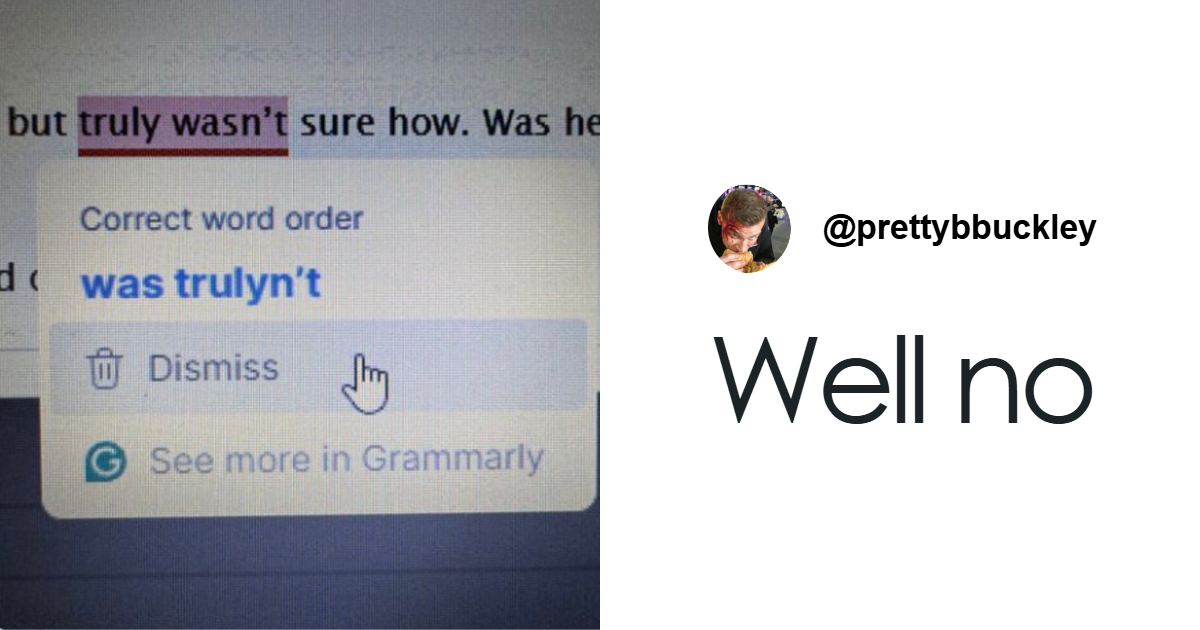This Online Group Exists To Shame Overconfident Know-It-Alls Who Incorrectly Correct People (New Pics)
Being publicly wrong in “real time” is one of those experiences so deeply uncomfortable that one tends to remember it at night for the next few decades. However, as humans, we can still find great ways to “enjoy” when others make the sort of mistakes that would mortify us.
There are few things funnier than someone being deeply convinced that they are right when they are blatantly incorrect. So get comfortable, since we’ve put together a lovely list of folks digging their own grave with utter confidence. Upvote your favorite posts and be sure to share your thoughts and experiences in the comments down below.
if (!BoredPanda.Config.isTabletWidth) {
if (BoredPanda.Config.departments.includes(‘main-editorial’)) {
pdID = BoredPanda.Config.experimentVariation < 2 ? 118361 : 118363;
} else if (BoredPanda.Config.departments.includes('news')) {
pdID = BoredPanda.Config.experimentVariation < 2 ? 117965 : 117967;
} else {
pdID = BoredPanda.Config.experimentVariation < 2 ? 116845 : 120299;
}
} else if (BoredPanda.Config.isTabletWidth) {
if (BoredPanda.Config.departments.includes('main-editorial')) {
pdID = BoredPanda.Config.experimentVariation < 2 ? 118540 : 118541;
} else if (BoredPanda.Config.departments.includes('news')) {
pdID = BoredPanda.Config.experimentVariation < 2 ? 118537 : 118538;
} else {
pdID = BoredPanda.Config.experimentVariation < 2 ? 118535 : 120301;
}
}
if (BoredPanda.Config.bpVersion === 'news') {
pdID = 119689;
}
trfData = BoredPanda.TrafficSources.getData();
_subIdParts = [
BoredPanda.Config.postId,
BoredPanda.Config.pos.filter((t) => !t.includes('_')).join('_'),
trfData.source.replace(',', '').substr(0, 20),
trfData.medium.replace(',', '').substr(0, 20),
trfData.campaign.replace(',', '').substr(0, 20),
];
subId = _subIdParts.join(',');
if (!BoredPanda.Config.isMobileWidth) {
(function (d, s, b) {
var mElmt, primisElmt = d.createElement('script');
primisElmt.setAttribute('type', 'text/javascript');
primisElmt.setAttribute('async', 'async');
primisElmt.setAttribute('src', s);
var elmtInterval = setInterval(function () {
mElmt = d.getElementById(b);
if (mElmt) {
mElmt.parentNode.insertBefore(primisElmt, mElmt.nextSibling);
mElmt.parentNode.removeChild(mElmt);
return clearInterval(elmtInterval);
}
}, 20);
})(document, 'https://live.primis.tech/live/liveView.php?s=' + pdID + '&subId=' + subId + '&playerApiId=bpbase_desktop', 'desktop-widget-loaded');
}
There’s a certain kind of bite that comes from being wrong to other individuals. Whether confidently getting it wrong in a meeting, butchering a word you’ve only ever looked at on a page, or strongly stating something that gets shot down the moment you say it, the embarrassment bites more sharply than you can imagine.
And for some inexplicable reason, these always seem to happen when you are in bed, running on repeat in your head as you lie on your back staring at the ceiling, wondering why your brain decided to run the “Personal Humiliation Greatest Hits” on repeat at midnight.
Behind this reaction lies our socially conditioned hard wiring. People lived in groups, and mere survival sometimes hung on how well we were succeeding in them. Being wrong, especially out there in public, happens to feel like a crack in that social standing. It whispers this unspoken message: “Maybe I’m not as competent, educated, and capable as I thought.” Sure, nobody’s actually banishing us from the tribe anymore, but our brains still experience these moments as some kind of social threat.
Public mistakes also encroach on one of our earliest self-protection instincts: “impression management”. Most of us put a lot of effort (overtly or in hiding) into creating what other individuals see in us. We want to seem competentnice, and confident. When we are eminently wrong, it feels as if we are watching a laboriously designed image fail and twist before our eyes, and we imagine that all the other individuals saw each pixel warp. Actually, most people probably forgot right away, but our own sense of self does not allow us that much leeway.
Public mistakes also encroach on one of our earliest self-protection instincts: “impression management”. Most of us put a lot of effort (overtly or in hiding) into creating what other individuals see in us. We want to seem competentnice, and confident. When we are eminently wrong, it feels as if we are watching a laboriously designed image fail and twist before our eyes, and we imagine that all the other individuals saw each pixel warp. Actually, most people probably forgot right away, but our own sense of self does not allow us that much leeway.
The haunting quality of these memories, especially at night, is a quirk of how the brain works. When we’re trying to sleep, the distractions of the day are gone, and the brain has space to wander. Unfortunatelyit often wanders toward moments that triggered strong emotional reactions, because those moments were tagged by our mind as “important.” Embarrassment, being a mix of shame and surprise, leaves a particularly sticky tag. The mind replays the memory as if it is trying to caution you not to make the same error, even though the mistake was harmless and took place years ago.
There is also a perfectionist impulse in all of us that can’t stand the idea that “everyone” screws up sometimes. We measure our previous selves by today’s standards and forget that the “you” at the time did not have the benefit of hindsight. Instead of viewing the event as a normal human hiccup, we rerun it like an habitual personality quirk preserved in amber.
Overlying that is the “spotlight effect”, our intrinsic proclivity to grossly overestimate the degree to which other people notice and remember our mistakes. Most people are really too busy concentrating on their own mistakes to pay attention to ours. Nevertheless, our brains relive the episode as if the whole crowd is still watching, still judging, still talking about “that time you used “ironic” when you meant to use “coincidental”.”
The shame lingers not because the incident was disastrous, but because it nudged against something deep: our phobia of not fitting in, of being seen as stupid, of not having social capital. And though those anxieties are correct on some primal survival level, they’re completely disproportionate to most contemporary situations.
The irony is that these moments make us more lovable, not less. People tend to trust those who can laugh at themselves and rebound from mistakes. But the brain at 2 A.M. doesn’t care about perspective, instead, it’s replaying a loop of that quality you called your teacher in class.
Finally, being publicly incorrect humiliates us because it momentarily shatters the armor around the self-image we present to the world. And those late-night rewinds? That’s just your brain, wrongly trying to “protect” you from repeating the error, while keeping you awake all night in the process.






